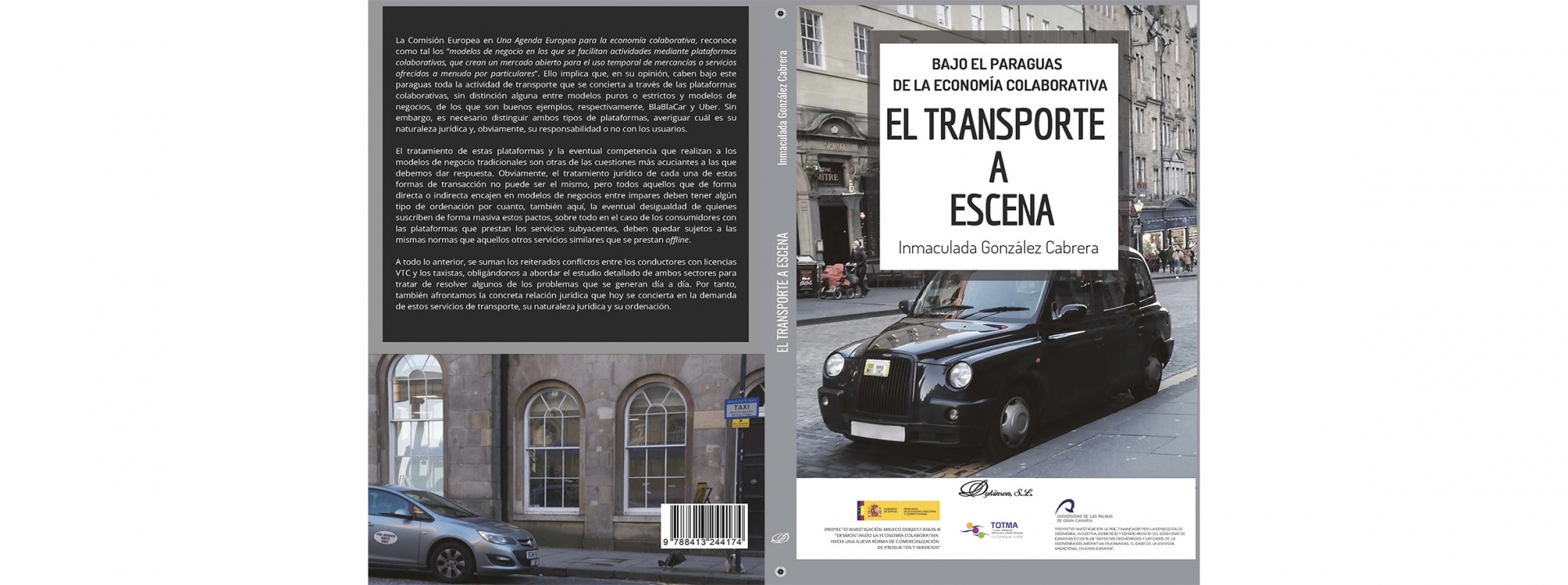The current regulation in Spain on taxis and VTC (Vehicle Transport with Driver) contains restrictions that unnecessarily harm end users by artificially limiting the number of vehicles in both cases and the possibility for companies to implement new services for the benefit of end users. This is stated by Inmaculada González Cabrera, head of the Tourism, Territorial Planning and Environment Group (TOTMA) of the University Institute of Aquaculture and Sustainable Marine Ecosystems (ECOAQUA), who has just launched 'El Transporte a escena', a monograph published by Dykinson in which she examines in depth the legal framework in our country.
González Cabrera, professor of Commercial Law at the University of Las Palmas de Gran Canaria (ULPGC), is a specialist in the collaborative economy and argues that current legislation must develop and understand that VTCs have developed and have become something else. "Now we are talking about taxis and VTCs as antagonistic elements and we need to let people know that in most cases they provide the same service, but they operate as two different business models. VTCs can no longer be classified as a collaborative economy model," she points out.
In her opinion, and as recommended by the National Commission for Markets and Competition (CNMC), a comprehensive and global regulatory approach to taxi and VTC activity should be adopted. "The new legal framework should focus on protecting and improving services for consumers and users, contrary to what has happened with the latest legal reforms, which have even reduced the competitiveness of both sectors, something that undoubtedly harms the end user".
In her book, Inmaculada González gives examples of the development of companies such as Uber, BlaBlaCar or Cabify, which use platforms to promote their services, and argues that the legislative chambers should implement the same rules for them as for those who provide similar services offline, always for the benefit of consumers.
"Most of the supralocal regulation in Spain is in favour of restricting VTCs to the benefit of taxis, but there has come a point where, with both models in place, we need to look for a framework similar to the one established in the United Kingdom, which makes the regulation of both parties more flexible," she suggests, "and always taking into account the rights of passengers, especially their safety," says the ECOAQUA researcher.
For this expert, not only VTCs will benefit, but also the taxi sector, as "the administration has created a bottleneck in the production of new licences and their amortisation makes the investment less and less profitable, something that is obscuring the sector with resales and subcontracting, sometimes outside of the law", she points out.
But the review of restrictions on the number of taxi licences should also be extended to VTC. "Now we have the situation that in cities such as Madrid or Barcelona, the number of vehicles operating already exceeds the number of licences that will be legally issued, which is inappropriate,".
The new legislation should "avoid unjustified discrimination between taxis and VTCs in terms of contracting, timetables and calendars, vehicle characteristics, circulation and parking, as well as in the uniforms drivers wear, and should make it possible in the future for VTCs to provide services not only in the autonomous community of origin", but, in synthesis, in such a way "that the consumer who pays for the service can access reasonable fares even when they are variable", as happens in the VTC sector, which fluctuates according to demand".
Inmaculada González, who among other titles has published 'Derecho de las empresas turísticas', 'Las viviendas vacacionales: Entre la economía colaborativa y la actividad mercantil', or 'El alojamiento turístico: Problemática y soluciones en la ejecución del contrato de hospedaje', got the information for this book through two projects developed at the ULPGC in which she participated with the TOTMA group of the University Institute ECOAQUA.
Specifically we are talking about “Desmontando la economía colaborativa: hacia una nueva forma de comercialización de productos y servicios”, within MINECO DER2017-85616-R, still in progress; and a second work funded by the Government Canary Islands CEI2018-2024: “Aspectos Económicos y Jurídicos de la Economía Colaborativa en Canarias”.


